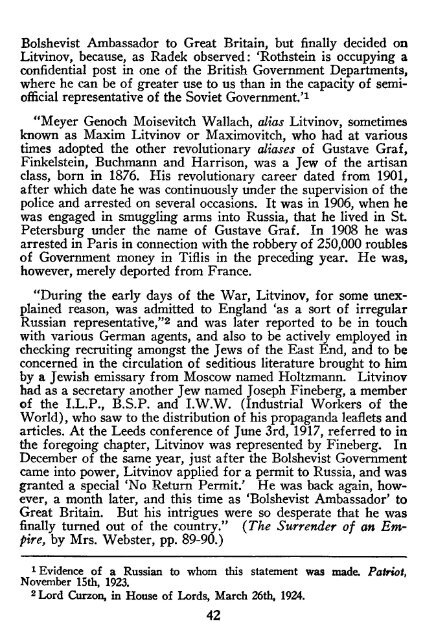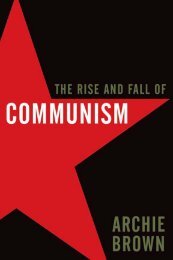B_345_The-Rulers-of-Russia
B_345_The-Rulers-of-Russia
B_345_The-Rulers-of-Russia
You also want an ePaper? Increase the reach of your titles
YUMPU automatically turns print PDFs into web optimized ePapers that Google loves.
Bolshevist Ambassador to Great Britain, but finally decided on<br />
Litvinov, because, as Radek observed: 'Rothstein is occupying a<br />
confidential post in one <strong>of</strong> the British Government Departments,<br />
where he can be <strong>of</strong> greater use to us than in the capacity <strong>of</strong> semi<strong>of</strong>ficial<br />
representative <strong>of</strong> the Soviet Government.' 1<br />
"Meyer Genoch Moisevitch Wallach, alias Litvinov, sometimes<br />
known as Maxim Litvinov or Maximovitch, who had at various<br />
times adopted the other revolutionary aliases <strong>of</strong> Gustave Graf,<br />
Finkelstein, Buchmann and Harrison, was a Jew <strong>of</strong> the artisan<br />
class, born in 1876. His revolutionary career dated from 1901,<br />
after which date he was continuously under the supervision <strong>of</strong> the<br />
police and arrested on several occasions. It was in 1906, when he<br />
was engaged in smuggling arms into <strong>Russia</strong>, that he lived in St.<br />
Petersburg under the name <strong>of</strong> Gustave Graf. In 1908 he was<br />
arrested in Paris in connection with the robbery <strong>of</strong> 250,000 roubles<br />
<strong>of</strong> Government money in Tiflis in the preceding year. He was,<br />
however, merely deported from France.<br />
"During the early days <strong>of</strong> the War, Litvinov, for some unexplained<br />
reason, was admitted to England 'as a sort <strong>of</strong> irregular<br />
<strong>Russia</strong>n representative," 2<br />
and was later reported to be in touch<br />
with various German agents, and also to be actively employed in<br />
checking recruiting amongst the Jews <strong>of</strong> the East End, and to be<br />
concerned in the circulation <strong>of</strong> seditious literature brought to him<br />
by a Jewish emissary from Moscow named Holtzmann. Litvinov<br />
had as a secretary another Jew named Joseph Fineberg, a member<br />
<strong>of</strong> the I.L.P., B.S.P. and I.W.W. (Industrial Workers <strong>of</strong> the<br />
World), who saw to the distribution <strong>of</strong> his propaganda leaflets and<br />
articles. At the Leeds conference <strong>of</strong> June 3rd, 1917, referred to in<br />
the foregoing chapter, Litvinov was represented by Fineberg. In<br />
December <strong>of</strong> the same year, just after the Bolshevist Government<br />
came into power, Litvinov applied for a permit to <strong>Russia</strong>, and was<br />
granted a special 'No Return Permit/ He was back again, however,<br />
a month later, and this time as 'Bolshevist Ambassador' to<br />
Great Britain. But his intrigues were so desperate that he was<br />
finally turned out <strong>of</strong> the country." (<strong>The</strong> Surrender <strong>of</strong> an Empire,<br />
by Mrs. Webster, pp. 89-90.)<br />
1<br />
Evidence <strong>of</strong> a <strong>Russia</strong>n to whom this statement was made. Patriot,<br />
November 15th, 1923.<br />
2<br />
Lord Curzon, in House <strong>of</strong> Lords, March 26th, 1924.<br />
42





